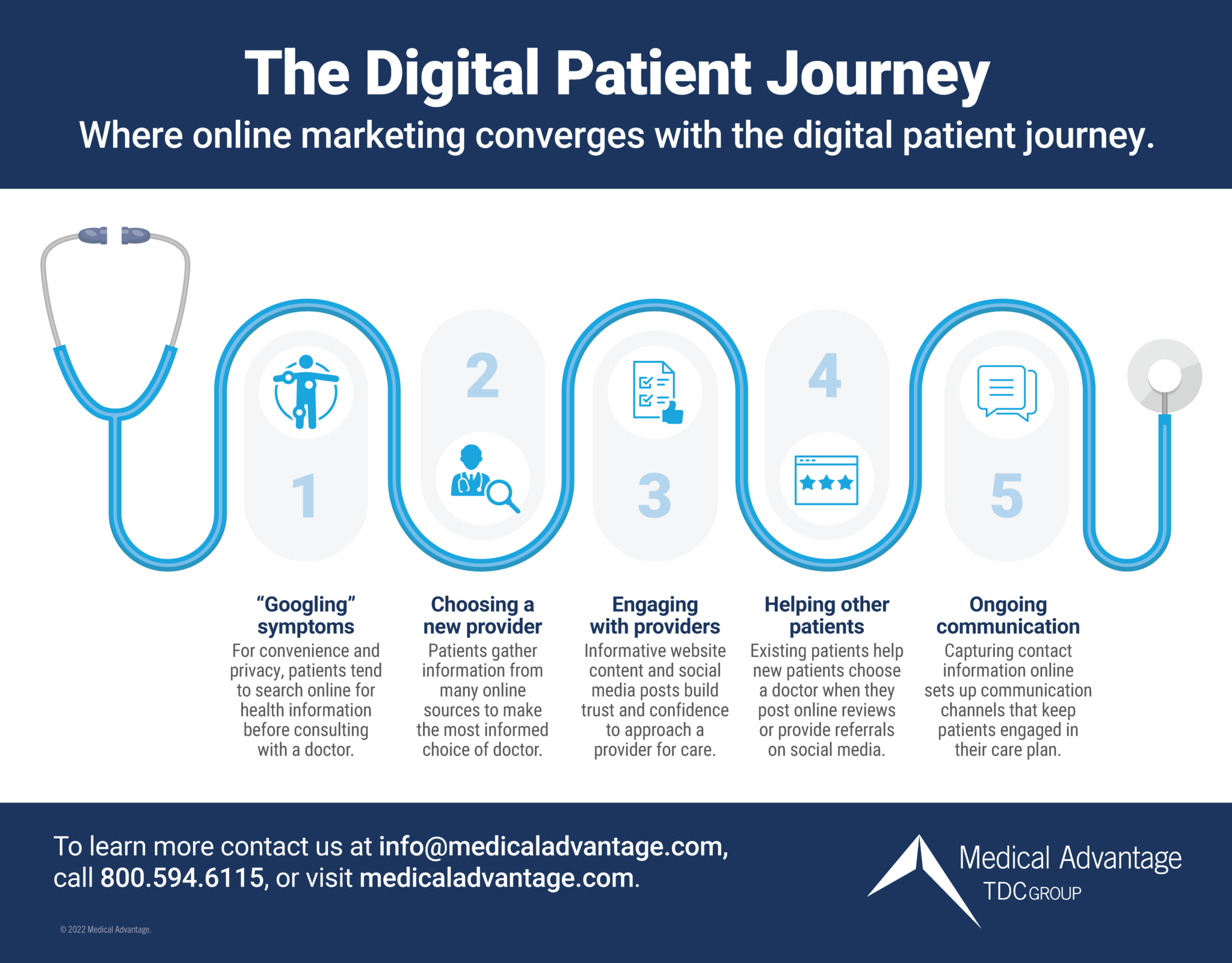Medical marketing is about growing revenue for the business side of your medical practice, but it has also converged with the modern patient journey. With digital commercialization, patients now select healthcare like they would any other service, leading to the term “healthcare consumers”.
“What is medical marketing?” is a question to be approached from more than one angle, including how it grows a patient base, generates increased ROI and patient lifetime value, nurtures healthcare brands, or encourages engagement for improved care outcomes.
The revolution of mobile technology is a significant patient engagement opportunity in addition to the benefit of attracting new patients through digital marketing. High patient engagement is conducive to better patient outcomes, and engagement is often initiated through digital marketing channels.
What Is Healthcare Marketing?
Healthcare digital marketing is a multichannel effort toward making a community aware of what an organization is doing to serve patients. However, the primary objective of this effort is to position a practice as being the best choice among the competition, as to attract the right patient.
What is medical marketing in a diverse healthcare landscape? Well, who your target audience is depends on your practice model. For example, brick-and-mortar medical facilities will focus on the local community. Some providers will market to those who have insurance, while concierge practice marketing will target cash-pay patients. App-based telehealth marketing will have a broader strategy not in the same lane as localized marketing.
The truth is that today’s patient has an overwhelming number of choices for a healthcare provider, so being diligent to reach your target audience online is paramount to practice success and survival. Even if a patient passes by your practice every week, they may still choose a provider found in an online search because so many of us rely on our mobile devices to help us make everyday decisions.
But keep in mind that healthcare marketing is also a public relations and brand-nurturing opportunity. You probably started your own practice because you wanted to serve patients in a different way from what is already out there, and through digital marketing you can make that story known.
Benefits of Investing in Digital Marketing for Your Medical Practice
Some may look at physician marketing as just another practice operations line-item expense, but it is really an investment for the longevity and success of your healthcare operations. Practices can build and maintain credibility while growing a patient base at a steady pace.
Digital marketing allows practices to target patients based on highly specific characteristics, and once the ideal patient has been identified (the one who is most likely to follow through with an appointment) you can build a strategy to reach that patient. Digital marketing also helps the patient find care the moment they need it and helps them take action quickly.
Medical marketing is about connecting with the prospects who need your services, and digital marketing helps you zero in on your public outreach.
Join us in discussion about how mobile technology and digital marketing have forever transformed the patient journey.
Healthcare Marketing is All About Patient Experience
What is medical marketing’s role in the patient experience? Digital marketing has transformed the patient experience from the first step to becoming a new patient to continuing the care journey with a provider.
“Digital front door” enables patients to readily access healthcare on demand, however some providers are still slow to adopt a centralized digital model. However, a seamless digital patient experience makes it easier for patients to remain engaged with their providers and their care plans.
Digital front door and digital marketing for doctors intersects with the patient journey when a patient:
- Is looking for answers to health questions. It is easy to forget that Google is a digital marketing platform, but when a patient is entering queries, they are engaging in a space that is commercialized on top of being informative.
- Needs care and is ready to find a provider. Patients no longer need call around to find a doctor as many of their questions can be answered on the internet. They can also access reviews to hear from other patients which helps them choose the best provider for their needs.
- Connects with choice of provider. An interactive medical practice website can turn a site visitor into a new patient faster with features such as an online appointment request form.
- Reads or leaves a review. Online reviews are patients helping patients choose the right doctor. By reading reviews, patients can make these crucial decisions with added confidence.
- Agrees to digital communication. Once a patient has established care, a provider can contact them with personalized messages via text and email, educational information, and important updates to retain engagement.

Putting Together a Medical Marketing Strategy: Knowing Your Tools
When a medical practice is ready to join the ranks of the many providers who reap the rewards of digital marketing, this means putting a plan together. Even if you plan to hire a medical marketing firm, it helps to understand how it all works so you can ask those questions that help you make an informed decision.
It All Starts With Your Website
What is medical marketing piece by piece? There are many digital marketing channels, but it begins with your anchor piece – the medical practice website. Having a well-equipped website is the foundation of your online presence. And unlike other digital marketing tools, you have more control over how it presents your practice brand.
Engaging websites are also effective at winning new patients when they do well to give them all the reassuring information they need and make it easy for them to become a new patient (patient request forms, click-to-call phone numbers at the top of each page).
Drive Traffic with Search Engine Optimization
You can have the coolest website in town, but without search engine marketing, it is highly unlikely that patients looking for a provider will find it. SEO (search engine optimization) is all about sending the best signals to Google so you will be ranked higher. Google favors sites that are:
- Fast-loading
- Mobile-friendly
- Easy to navigate
- Implementing keyword strategy and publishing regular blog content.
- Well-configured for Google’s data gathering crawlers.
Gaining rank on the merits of your website quality is called organic search. As mentioned before, Google search is commercialized and some of the results are there as a result of paid search.
Target Precise Audiences with Pay Per Click Advertising
Pay-per-click for medical practices is the fast track to being found in search results. Google’s ads platform is a complete marketing campaign management platform that allows you to bid on the best keywords for your medical practice marketing strategy. You only pay when someone clicks on your ad, but since this can add up quickly, it is best to run campaigns that reach qualified leads rather than a wide audience.
Make Good Impressions With Online Reputation Management
One of the most effective ways to compete with other practices is to have a stellar online reputation for your medical practice. Close to 90% of healthcare patients consult reviews before making a final decision on who they will go to for care.
For example, when a patient searches for a provider using Google, the localized results will give them a list of providers close to their location. The user will be able to see their star rating or if they have no reviews at all. A patient weighing their options is likely to pick the one with the better star rating and informative reviews.
Engage With Your Patients on Social Media
Social media for healthcare is a way to stay connected with patients outside of office hours, but it is also a way to capture positive patient sentiment for marketing power. Patients who take the time to interact with your social posts during their leisure time send a strong signal to non-patients that your practice leaves a great impression.
Also important to consider is that a patient may unfairly judge you if you don’t have an updated website nor any active social media accounts. This may give the impression that that you neglect your operations quality and that your practice is not equipped to meet their needs.
Steps to Building A Robust Marketing Strategy
Building a formidable online presence means having many channels activated along with a cohesive strategy to get the most from your investment. To get started, here are six core essentials for medical marketing strategies:
- Learn your market. What do patients want and how can you differentiate from other practices competing with you?
- Plan your budget. For healthcare marketing, the average budget is 9% of revenue.
- Update your website. Outdated websites deter prospective patients and hurt your online visibility.
- Claim and update your online directory profiles, especially Google My Business. For local search, a practice absolutely needs a Google listing.
- Set up your social media accounts and ask for patients to follow you.
- Ask for patients to leave reviews for your practice, especially on Google.
Choose the Path to Healthcare Marketing Success – Partner with a Team with a Proven Track Record
While planning takes a moderate amount of time, executing such a plan can be a full-time job. It is also extremely difficult to run an effective PPC campaign with no prior experience.
Getting the most from the resources you put into marketing means partnering with a team of medical marketers who understand the field inside and out, as we only serve healthcare organizations. We put together a complete and cohesive healthcare marketing plan that will steadily grow your patient base. Get in touch with a consultant today!



